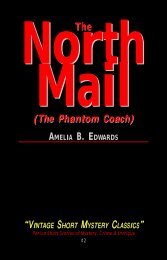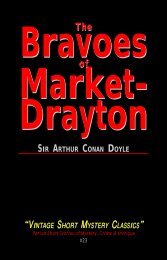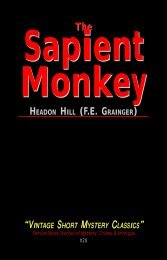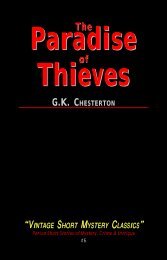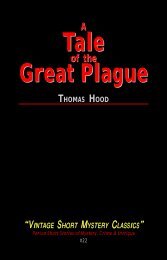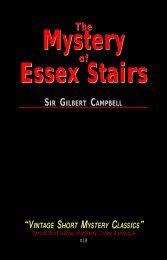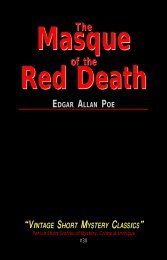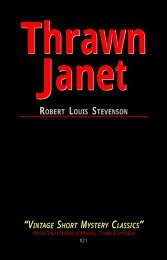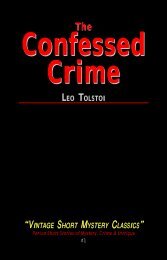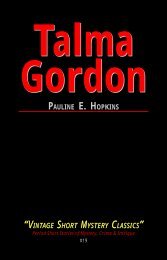Thomas of Reading Was Murdered - Hornpipe Vintage Publications
Thomas of Reading Was Murdered - Hornpipe Vintage Publications
Thomas of Reading Was Murdered - Hornpipe Vintage Publications
Create successful ePaper yourself
Turn your PDF publications into a flip-book with our unique Google optimized e-Paper software.
How How<br />
<strong>Thomas</strong> <strong>of</strong> <strong>Reading</strong><br />
<strong>Was</strong> <strong>Murdered</strong><br />
THOMAS DELONEY<br />
“VINTAGE SHORT MYSTERY CLASSICS”<br />
Period Short Stories <strong>of</strong> Mystery, Crime & Intrigue<br />
#8
All short stories in the “<strong>Vintage</strong> Short Mystery Classics” series are<br />
period works now in the public domain. These e-book presentations<br />
are published by:<br />
<strong>Hornpipe</strong> <strong>Vintage</strong> <strong>Publications</strong><br />
P.O. Box 18428<br />
Spartanburg, SC 29318<br />
www.hornpipe.com/mysclas.htm<br />
“<strong>Vintage</strong> Short Mystery Classics” have been selected by Daniel Elton<br />
Harmon, author <strong>of</strong> “The Harper Chronicles,” with the intent <strong>of</strong> introducing<br />
new readers to notable works <strong>of</strong> short historical fiction in<br />
the mystery/gothic/crime vein. For more information, please visit the<br />
author’s Web site at www.danieleltonharmon.com.<br />
Details <strong>of</strong> <strong>Thomas</strong> Deloney’s life have been all but obliterated by a<br />
dearth <strong>of</strong> original records and the passage <strong>of</strong> time. We know he was<br />
a silk weaver by trade; a prolific ballad writer and author <strong>of</strong> several<br />
book-length prose works, as well as pamphlets, by avocation. One source<br />
gives his birth year as 1543, and evidence suggests he haled from either<br />
Norwich or London.<br />
Tradesmen were the subjects <strong>of</strong> much <strong>of</strong> his writing. This tale is from his<br />
book <strong>Thomas</strong> <strong>of</strong> <strong>Reading</strong>, also titled The Six Worthy Yeomen <strong>of</strong> the<br />
West. It’s believed Deloney wrote it around 1597 and died within<br />
three years <strong>of</strong> its completion. It’s included in the current series not only<br />
because <strong>of</strong> its plot (which should engage you admirably, if you can<br />
weather the period prose style) but also its Elizabethan derivation.<br />
—DEH
How <strong>Thomas</strong> <strong>of</strong> <strong>Reading</strong><br />
<strong>Was</strong> <strong>Murdered</strong><br />
T homas<br />
<strong>of</strong> <strong>Reading</strong> having many occasions to come<br />
to London, as well about his own affairs, as also on<br />
the King’s business, being in great <strong>of</strong>fice under his<br />
Majesty, it chanced on a time, that his host and hostess <strong>of</strong><br />
Colebrook (who through covetousness had murdered many<br />
<strong>of</strong> their guests) appointed him to be the next fat pig that<br />
should be killed: for it is to be understood, that, when<br />
they plotted the murder <strong>of</strong> any man, this was always their<br />
formula: “Wife, there is now a fat pig to be had, if you<br />
want one.” Whereupon she would answer thus: “I pray<br />
you put him in the hogsty till to-morrow.”<br />
This was when any man came thither alone without<br />
others in his company, and they saw he had great store <strong>of</strong><br />
money. This man should then be laid in the chamber right<br />
over the kitchen, which was a fair chamber, and better set<br />
out than any other in the house: the best bedstead therein,<br />
though it were little and low, yet was it most cunningly<br />
carved, and fair to the eye: the feet where<strong>of</strong> were fast nailed<br />
to the chamber floor, in such sort that it could not in any<br />
wise fall, and the bed that lay therein was fast sewed to<br />
the sides <strong>of</strong> the bedstead. Moreover, that part <strong>of</strong> the chamber<br />
whereupon the bedstead stood was made in such sort,<br />
that, by the pulling out <strong>of</strong> two iron pins below in the<br />
kitchen, it was to be let down and taken up by a drawbridge,<br />
or in manner <strong>of</strong> a trap-door: moreover, in the<br />
kitchen, directly under the place where this should fall,
2 How <strong>Thomas</strong> <strong>of</strong> <strong>Reading</strong> <strong>Was</strong> <strong>Murdered</strong><br />
was a mighty great cauldron, wherein they used to seethe<br />
their liquor when they went to brewing. Now the men<br />
appointed for the slaughter were laid into this bed, and in<br />
the dead time <strong>of</strong> the night, when they were sound asleep,<br />
by plucking out the aforesaid iron pins, down would the<br />
man fall out <strong>of</strong> his bed into the boiling cauldron, and all<br />
the clothes that were upon him: where being suddenly<br />
scalded and drowned, he was never able to cry or speak<br />
one word.<br />
Then had they a little ladder ever standing ready in<br />
the kitchen, by the which they presently mounted into<br />
the said chamber, and there took away the man’s apparel,<br />
as also his money, in his mail or capcase: and then lifting<br />
up the said falling floor which hung by hinges, they made<br />
it fast as before. The dead body would they take presently<br />
out <strong>of</strong> the cauldron, and throw it down the river, which<br />
ran near unto their house.<br />
Now if in the morning any <strong>of</strong> the rest <strong>of</strong> the guests<br />
that had talked with the murdered man ere eve, chanced<br />
to ask for him, as having occasion to ride the same way<br />
that he should have done, the god man would answer,<br />
that he took horse a good while before day, and that he<br />
himself did set him forward. The horse the good man<br />
would also take out <strong>of</strong> the stable, and convey him to a hay<br />
barn <strong>of</strong> his, that stood from his house a mile or two, where<strong>of</strong><br />
himself did always keep the keys full charily, and when<br />
any hay was to be brought from thence, with his own<br />
hands he would deliver it: then before the horse should<br />
go from thence, he would dismark him: as, if he had a<br />
long tail, he would make him curtail; or else crop his ears,<br />
or cut his mane, or put out one <strong>of</strong> his eyes: and by this<br />
means he kept himself unknown.
How <strong>Thomas</strong> <strong>of</strong> <strong>Reading</strong> <strong>Was</strong> <strong>Murdered</strong> 3<br />
Now <strong>Thomas</strong> <strong>of</strong> <strong>Reading</strong>, as I said before, being<br />
marked and kept for a fat pig, he was laid in the same<br />
chamber <strong>of</strong> death, but by reason Gray <strong>of</strong> Gloucester<br />
chanced also to come that night, he escaped scalding.<br />
The next time he came he was laid there again, but<br />
before he fell asleep, or was warm in bed, one came riding<br />
through the town and cried piteously that London was all<br />
a fire, and that it had burned down <strong>Thomas</strong> Becket’s house<br />
in West Cheap, and a great number more in the same<br />
street. “And yet,” quoth he, “the fire is not quenched.”<br />
Which tidings when <strong>Thomas</strong> <strong>of</strong> <strong>Reading</strong> heard, he was<br />
very sorrowful, for <strong>of</strong> this same Becket that day he had<br />
received a great piece <strong>of</strong> money, and had left in his house<br />
many <strong>of</strong> his writings, and some that appertained to the<br />
King also: therefore there was no way but he would ride<br />
back to London presently, to see how the matter stood:<br />
thereupon making himself ready he departed. This cross<br />
fortune caused his host to frown. “Nevertheless,” quoth<br />
he, “the next time will pay for all.”<br />
Notwithstanding, God so wrought, that they were<br />
prevented then likewise by reason <strong>of</strong> a great fray that happened<br />
in the house betwixt a couple that fell out at dice;<br />
insomuch as the murderers themselves were enforced to<br />
call him up, being a man in great authority, that he might<br />
set the house in quietness; out <strong>of</strong> the which by means <strong>of</strong><br />
this quarrel, they doubted to lose many things.<br />
Another time when he should have been laid in the<br />
same place, he fell so sick, that he requested to have somebody<br />
to watch with him; whereby also they could not<br />
bring their vile purpose to pass. But hard it is to escape<br />
the illfortunes whereunto man is allotted: for albeit that<br />
the next time that he came to London, his horse stumbled
4 How <strong>Thomas</strong> <strong>of</strong> <strong>Reading</strong> <strong>Was</strong> <strong>Murdered</strong><br />
and broke one <strong>of</strong> his legs as he would ride homeward, yet<br />
hired he another to hasten his own death; for there was no<br />
remedy but he should go to Colebrook that night: but by<br />
the way he was heavy asleep that he could scant keep himself<br />
in his saddle; and when he came near unto the town,<br />
his nose burst out suddenly a bleeding.<br />
Well, to his inn he came, and so heavy was his heart<br />
that he could eat no meat: his host and hostess hearing he<br />
was so melancholy, came up to cheer him, saying: “Why,<br />
Master Cole*, what ails you to-night? Never did we see<br />
you thus sad before: will it please you to have a quart <strong>of</strong><br />
burnt sack?”<br />
“With a good will,” quoth he, “and I would that Tom<br />
Dove were here, he would surely make me merry, and we<br />
should lack no music: but I am sorry for the man with all<br />
my heart, that he is come so far behindhand: alas, so much<br />
can every man say, but what good doth it him? No, no, it<br />
is not words can help a man in this case, the man hath<br />
need <strong>of</strong> other relief than this. Let me see: I have but one<br />
child in the world and that is my daughter; half that I<br />
have is hers, the other half my wife’s. What then, shall I<br />
be good to nobody but them? In conscience, my wealth is<br />
too much for a couple to possess: and what is our religion<br />
without charity? And to whom is charity more to be shown<br />
than to decayed householders? Good my host, lend me a<br />
pen and ink, and some paper; for I will write a letter unto<br />
the poor man straight; and something I will give him.<br />
The alms which a man bestows with his own hands he<br />
shall be sure to have delivered, and who knows how long<br />
I shall live?”<br />
* Editor: “Master Cole” is <strong>Thomas</strong> <strong>of</strong> <strong>Reading</strong>.
How <strong>Thomas</strong> <strong>of</strong> <strong>Reading</strong> <strong>Was</strong> <strong>Murdered</strong> 5<br />
With that his hostess dissembling answered: “Doubt<br />
not, Master Cole, you are like enough by the course <strong>of</strong><br />
nature to live many years.”<br />
Quoth he: “I never found my heart so heavy before.”<br />
By this time pen, ink, and paper were brought, and<br />
he wrote as followeth: “In the Name <strong>of</strong> God, Amen. I<br />
bequeath my soul to God, and my body to the ground,<br />
my goods equally between my wife Elinor and my daughter<br />
Isabel. Item. I give to <strong>Thomas</strong> Dove <strong>of</strong> Exeter one hundred<br />
pounds, nay, that is too little, I give to <strong>Thomas</strong> Dove<br />
two hundred pounds in money, to be paid unto him presently<br />
upon his demand there<strong>of</strong>, by my said wife and daughter.”<br />
“Ha, how sayest thou, host,” quoth he, “is not this<br />
well? I pray you read it.”<br />
His host looking thereupon, said: “Why, Master Cole,<br />
what have you written here? You said you would write a<br />
letter, but methinks you have made a will, what need have<br />
you to do thus? Thanks be to God, you may live many fair<br />
years.”<br />
“’Tis true,” quoth Cole, “if it please God: and I trust<br />
this writing cannot shorten my days. But let me see, have<br />
I made a will? Now, I promise you, I did verily purpose to<br />
write a letter: notwithstanding, I have written that which<br />
God put into my mind. But look again my host, is it not<br />
written there that Dove shall have two hundred pounds,<br />
to be paid when he comes to demand it?”<br />
“Yes, indeed,” said his host.<br />
“Well then, all is well,” said Cole, “and it shall go as<br />
it is.”<br />
Then folding it up he sealed it, desiring that his host<br />
should send it to Exeter. He promised that he would:
6 How <strong>Thomas</strong> <strong>of</strong> <strong>Reading</strong> <strong>Was</strong> <strong>Murdered</strong><br />
notwithstanding Cole was not satisfied, but after some<br />
pause, he would needs hire one to carry it. And so sitting<br />
down sadly in his chair again, upon a sudden he burst<br />
forth a weeping; they demanding the cause there<strong>of</strong> he<br />
spake as followeth: “No cause <strong>of</strong> these fears I know: but it<br />
cometh into my mind, how when I set toward this my<br />
last journey to London, how my daughter took on, what a<br />
coil she kept me stay: and I could not be rid <strong>of</strong> the little<br />
baggage a long time, she did so hang about me; when her<br />
mother by violence took her away, she cried out most<br />
mainly: ‘O my father, my father, I shall never see him again.’”<br />
“Alas, pretty soul,” quoth his hostess, “this was but<br />
mere kindness in the girl, and it seemeth she is very fond<br />
<strong>of</strong> you. But alas, why should you grieve at this? You must<br />
consider that it was but childishness.”<br />
“Ay, it is indeed,” said Cole, and with that he began<br />
to nod.<br />
Then they asked him if he would go to bed.<br />
“No,” he answered, “although I am heavy, I have no<br />
mind to go to bed at all.”<br />
With that certain musicians <strong>of</strong> the town came to the<br />
chamber, and knowing Master Cole was there, drew out<br />
their instruments, and very solemnly began to play.<br />
“This music comes very well,” said Cole, and when<br />
he had listened awhile thereunto, he said: “Methinks these<br />
instruments sound like the ring <strong>of</strong> St. Mary Overies bells,<br />
but the bass drowns all the rest: and in my ear it is like a<br />
bell that rings a forenoon’s knell. I pray you let them leave<br />
<strong>of</strong>f, and bear them this simple reward.”<br />
The musicians being gone, his host asked if now it<br />
would please him to go to bed: “for,” quoth he, “it is well<br />
near eleven <strong>of</strong> the clock.”
How <strong>Thomas</strong> <strong>of</strong> <strong>Reading</strong> <strong>Was</strong> <strong>Murdered</strong> 7<br />
With that Cole, beholding his host and hostess earnestly,<br />
began to start back, saying: “What ails you to look<br />
so like pale death? What have you done, that your hands<br />
are thus bloody?”<br />
“What, my hands?” said the host. “Why, you may<br />
see they are neither bloody nor foul: either your eyes do<br />
greatly dazzle, or else fancies <strong>of</strong> a troubled mind do delude<br />
you.”<br />
“Alas, my host, you may see,” quoth he, “how weak<br />
my wits are, I never had my head so idle before. Come, let<br />
me drink once more, and then I will to bed, and trouble<br />
you no longer.”<br />
With that he made himself ready, and his hostess<br />
was very diligent to warm a kerchief and put it about his<br />
head. Said he: “I am not sick, thank God, but such an<br />
alteration I find in myself as I never did before.”<br />
With that the screech-owl cried piteously, and anon<br />
after the night raven sat croaking hard by his window.<br />
“Mercy upon me,” quoth he, “what an ill-favoured cry do<br />
yonder carrion birds make.” And therewithal he laid him<br />
down in his bed, from whence he never rose again.<br />
His host and hostess, that all this while noted<br />
his troubled mind, began to commune betwixt themselves<br />
there<strong>of</strong>. And the man said, he knew not what were<br />
best to be done. “By my consent,” quoth he, “the matter<br />
should pass for I think it is best not to meddle with<br />
him.”<br />
“What, man,” quoth she, “faint you now? Have you<br />
done so many, and do you shrink at this?” Then, showing<br />
him a great deal <strong>of</strong> gold which Cole had left with her, she<br />
said: “Would it not grieve a body’s heart to lose this? Hang<br />
the old churl, what should he do living any longer? He
8 How <strong>Thomas</strong> <strong>of</strong> <strong>Reading</strong> <strong>Was</strong> <strong>Murdered</strong><br />
hath too much, and we have too little: tut, husband, let<br />
the thing be done, and then this is our own.”<br />
Her wicked counsel was followed, and when they<br />
had listened at his chamber door, they heard the man<br />
sound asleep. “All is safe,” quoth they; and down into the<br />
kitchen they go, their servants being all abed, and pulling<br />
out the iron pin, the man dropped out into the boiling<br />
cauldron. He being dead, they betwixt them cast his body<br />
into the river, his clothes they made away, and made all<br />
things as it should be: but when he came to the stable to<br />
convey thence Cole’s horse, the stable door being open,<br />
the horse had got loose, and with a part <strong>of</strong> the halter about<br />
his neck, and straw trussed under him as the ostlers had<br />
dressed him ere eve, he was gone out at the back ride,<br />
which led into a great field adjoining to the house, and so<br />
leaping divers hedges had got into a ground where a mare<br />
was grazing, with whom he kept up such a coil that they<br />
got into the highway, where one <strong>of</strong> the town, meeting<br />
them, knew the mare, and brought her and the horse to<br />
the man that owned her.<br />
In the mean space the musicians had been at the<br />
inn, and in requital <strong>of</strong> their evening gift, they intended to<br />
give Cole some music in the morning. The goodman told<br />
them he took horse before day: likewise there was a guest<br />
in the house that would have borne him company to <strong>Reading</strong>,<br />
to whom the host also answered, that he himself set<br />
him upon horseback, and that he went long ago. Anon<br />
came the man that owned the mare, inquiring up and<br />
down, to know if none <strong>of</strong> them missed a horse. Who said<br />
no. At last he came to the sign <strong>of</strong> the Crane, where Cole<br />
lay: and calling the ostlers he demanded <strong>of</strong> them if they<br />
lacked one, and they said no.
How <strong>Thomas</strong> <strong>of</strong> <strong>Reading</strong> <strong>Was</strong> <strong>Murdered</strong> 9<br />
“Why then,” said the man, “I perceive my mare is<br />
good for something, for if I send her to the field single,<br />
she will come home double.” Thus it passed on all that<br />
day and the night following.<br />
But the next day after, Cole’s wife, musing that her<br />
husband came not home, sent one <strong>of</strong> her men on horseback<br />
to see if he could meet him. “And if,” quoth she,<br />
“you meet him not betwixt this and Colebrook, ask for<br />
him at the Crane, but if you find him not there, then ride<br />
to London: for I doubt he is either sick, or else some mischance<br />
hath fallen upon him.”<br />
The fellow did so, and asking for him at Colebrook,<br />
they answered, he went homeward from thence such a<br />
day. The servant musing what should be become <strong>of</strong> his<br />
master, and making inquiry in the town for him: at length<br />
one told him <strong>of</strong> a horse that was found on the highway,<br />
and no man knew whence he came. He going to see the<br />
horse, knew him presently, and to the Crane he goes with<br />
him. The host <strong>of</strong> the house perceiving this, was blank,<br />
and that night fled secretly away. The fellow going unto<br />
the Justice desired his help. Presently after word was<br />
brought that Jarman <strong>of</strong> the Crane was gone: then all the<br />
men said, he had sure made away with Cole: and the<br />
musicians told what Jarman said to them when they would<br />
have given Cole music. Then the woman being apprehended<br />
and examined, confessed the truth. Jarman soon<br />
after was taken in Windsor Forest. He and his wife were<br />
both hanged, after they had laid open all these things<br />
before expressed. Also he confessed, that he being a carpenter<br />
made that false falling floor, and how his wife devised<br />
it. And how they had murdered by that means forty<br />
persons. And yet notwithstanding all the money which
10 How <strong>Thomas</strong> <strong>of</strong> <strong>Reading</strong> <strong>Was</strong> <strong>Murdered</strong><br />
they had gotten thereby, they prospered not, but at their<br />
death were found in dept.<br />
When the King heard <strong>of</strong> this murder, he was for the<br />
space <strong>of</strong> seven days so sorrowful and heavy, as he would<br />
not hear any suit: giving also commandment, that the<br />
house should quite be consumed with fire, wherein Cole<br />
was murdered, and that no man should ever build upon<br />
that cursed ground.<br />
Cole’s substance at his death was exceeding great: he<br />
had daily in his house an hundred men servants, and forty<br />
maids: he maintained besides above two or three hundred<br />
people, spinners, and carders, and a great many other<br />
householders. His wife after never married, and at her death<br />
she bestowed a mighty sum <strong>of</strong> money towards the maintaining<br />
<strong>of</strong> the new builded monastery. Her daughter was<br />
most richly married to a gentleman <strong>of</strong> great worship, and<br />
she had many children. And some say that the river<br />
wherein Cole was cast, did ever since carry the name <strong>of</strong><br />
Cole, being called the river <strong>of</strong> Cole, and the town <strong>of</strong><br />
Colebrook.<br />
—THOMAS DELONEY
Dabbling in Mystery. . . .<br />
Have a hankering to explain the hitherto unexplained?<br />
Curious about the lives <strong>of</strong> noted mystery<br />
authors? Intrigued by their fabricated puzzles<br />
—and by real-life enigmas?<br />
Join author Daniel Elton Harmon on the Internet<br />
in wide-ranging discourses on historical riddles,<br />
unique crimes, the supernatural and the starkly<br />
odd. “Mysterious Expeditions” presents notes and<br />
commentaries on true mysteries as well as vintage<br />
mystery authors and their works. AND . . . you’re<br />
encouraged to contribute your own findings! Pay<br />
a call to this exciting new historical mystery blog:<br />
http://mysteriousexpeditions.blogspot.com.<br />
South Carolina author and editor Daniel Elton Harmon has written<br />
more than fifty books. Recently published by Chelsea House are his six<br />
volumes in the “Exploration <strong>of</strong> Africa: The Emerging Nations” series;<br />
The Titanic, part <strong>of</strong> the “Great Disasters: Reforms and Ramifications”<br />
series; his history <strong>of</strong> the Hudson River for the “Rivers in American Life<br />
and Times” series; and juvenile biographies in the “Explorers <strong>of</strong> New<br />
Worlds” series. Other <strong>of</strong> his books are published by Wright/McGraw-<br />
Hill, Mason Crest and Barbour Publishing. His freelance articles have<br />
appeared in such periodicals as Nautilus, Music Journal and The New York<br />
Times. Harmon is the associate editor <strong>of</strong> Sandlapper: The Magazine <strong>of</strong><br />
South Carolina and editor <strong>of</strong> The Lawyer’s PC, a technology newsletter.<br />
The Chalk Town Train & Other Tales: “The Harper Chronicles,” Volume<br />
One is his first book <strong>of</strong> fiction and the first <strong>of</strong> his series <strong>of</strong> short story<br />
collections that follow the career <strong>of</strong> Harper the crime reporter.
Harper is at the scene. . . .<br />
Six unmarked graves hold the secret<br />
to an older generation’s hideous ordeal.<br />
. . .<br />
Escaped convicts invade a riverside<br />
campsite. . . .<br />
A ring <strong>of</strong> prestigious businessmen<br />
carry out a massive estate swindle in<br />
the state capital. . . .<br />
Shipwreck survivors sheltered at a<br />
Low Country fishing village have<br />
much, much to hide. . . .<br />
And the president <strong>of</strong> the United States turns to a small-city<br />
journalist to intercept a potentially disastrous item <strong>of</strong> diplomatic<br />
correspondence. . . .<br />
Harper, nonconformist crime reporter for the fledgling Challenge,<br />
finds himself in the thick <strong>of</strong> these and other dramas in the<br />
post-Reconstruction South. Through intuition, deduction, focused<br />
research and on-the-scene investigation, Harper probes to the<br />
heart <strong>of</strong> each affair. In the process, he <strong>of</strong>ten uncovers facts and<br />
circumstances he can never publish—and enters the hazy borderland<br />
between observer and participant.<br />
The Chalk Town Train & Other Tales, Daniel Elton Harmon’s first<br />
volume <strong>of</strong> “Harper” short stories, has received rave reviews in<br />
history/mystery circles and is available in print. Visit<br />
www.danieleltonharmon.com to learn more about this exciting<br />
new series and read what the critics are saying!<br />
An author-signed copy <strong>of</strong> The Chalk Town Train & Other Tales<br />
(s<strong>of</strong>tbound, 157 pages) costs $15 postpaid. Please make check or<br />
money order payable to “Dan Harmon” and mail to the author at<br />
P.O. Box 18428, Spartanburg, SC 29318.<br />
(Note: We cannot conscientiously support credit card companies and<br />
thus do not accept credit card orders.)



